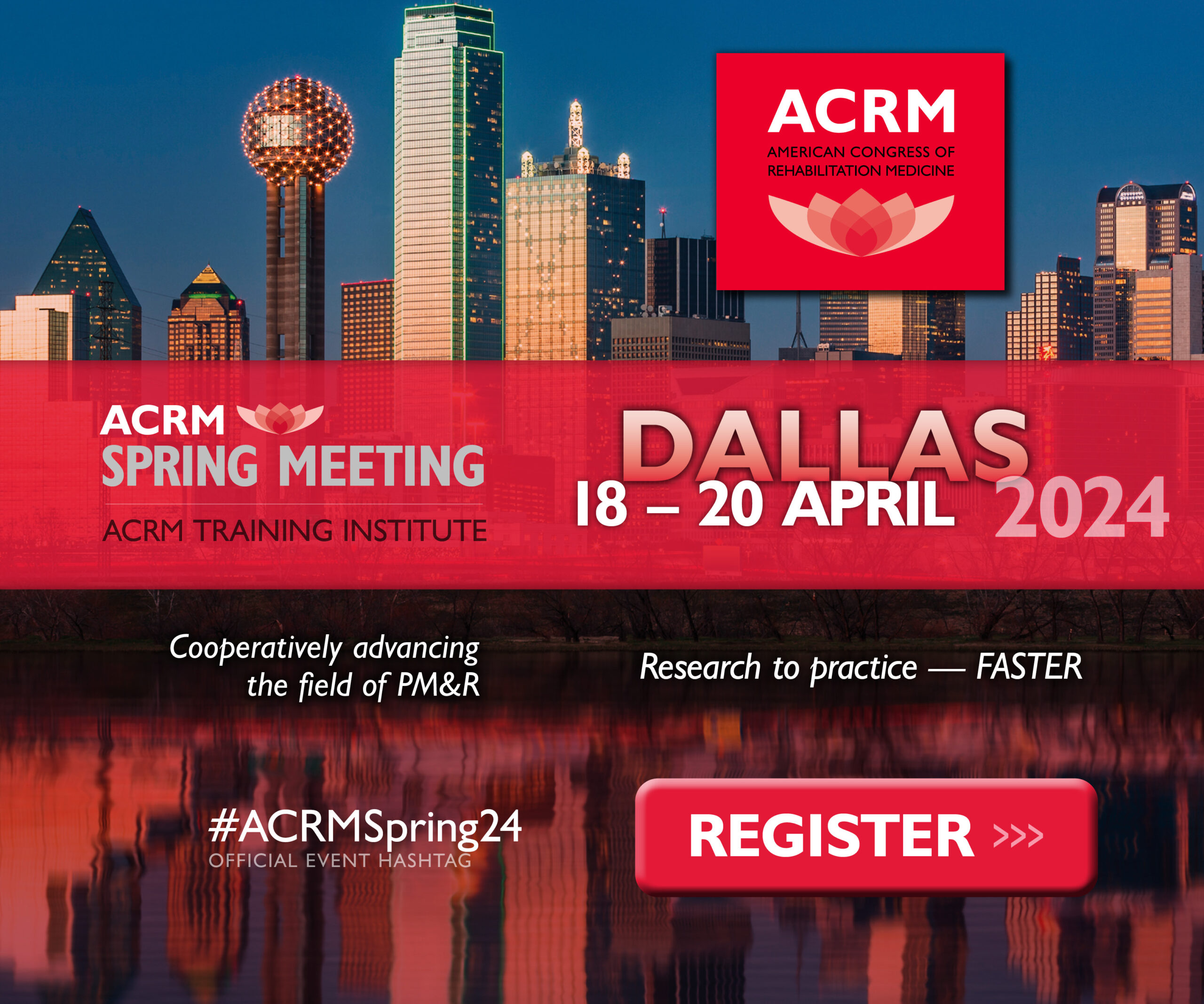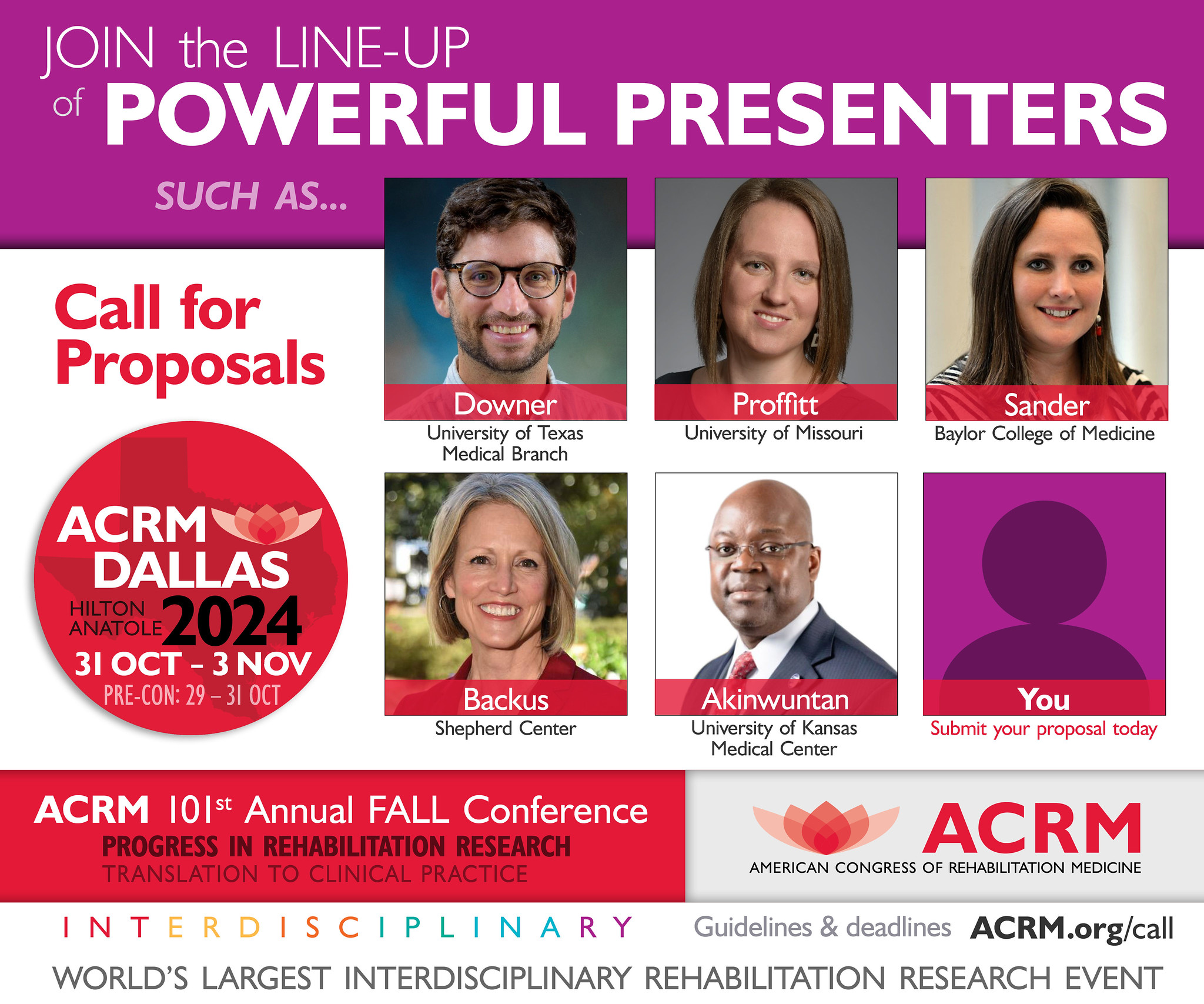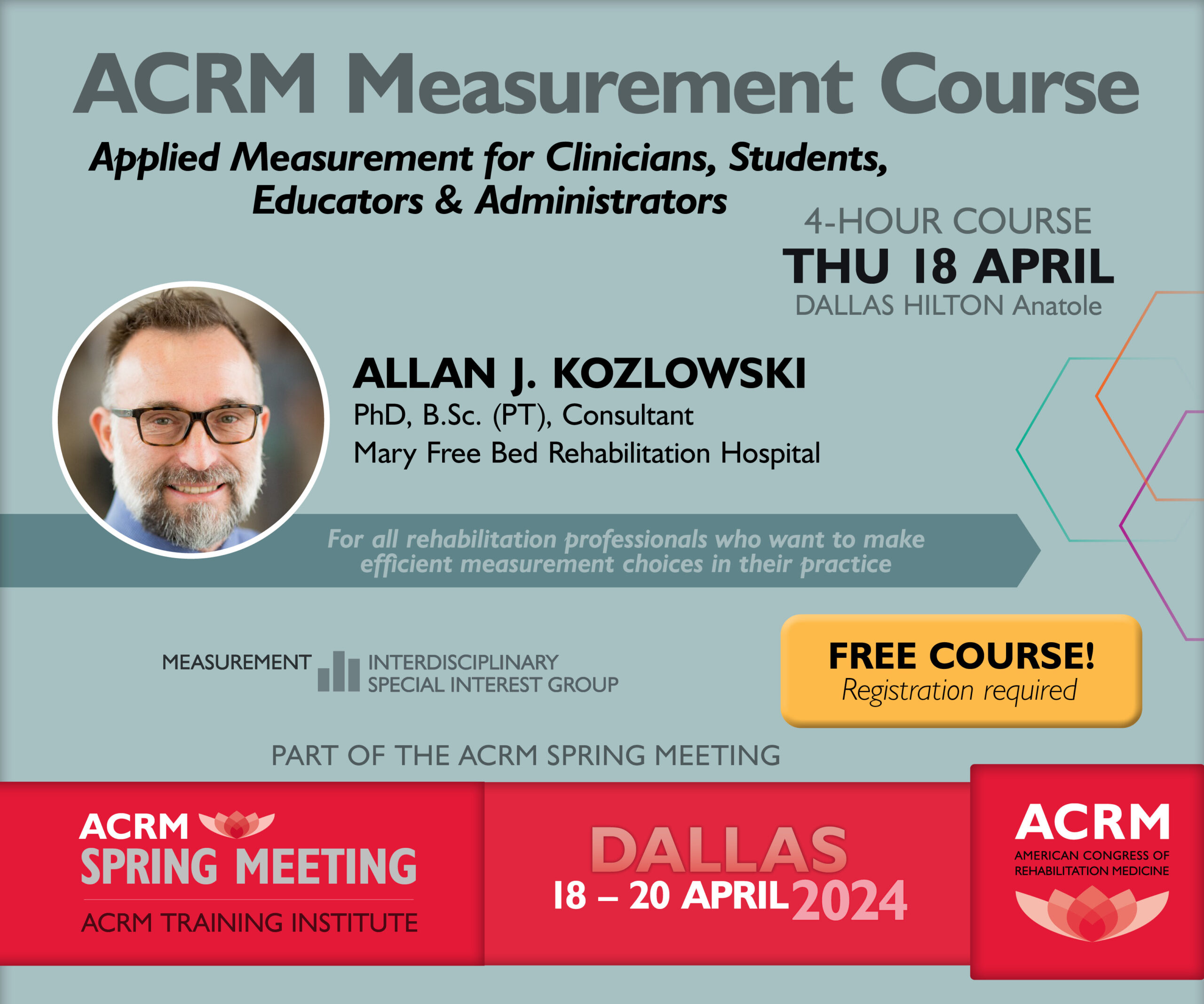2019 Conference Highlights
View Special Symposia >>
View Awarded Lectures >>
View Hot Topics >>
View Instructional Courses >>
Join Us In Chicago!
All conference attendees are automatically ACRM members. Non-members receive a 6-month introductory ACRM membership automatically with registration. Put your member benefits to work right away—join an ACRM community group and attend a community group or task force meeting! PLEASE NOTE: Dates and times are subject to change. Please check the Online Program for the most up-to-date information.
Thursday 7 NOV
7:00 AM – 8:00 AM
- Pediatric Rehabilitation Networking Group Annual Meeting (open for ALL to attend)
Location: 4M, 4th Floor
Special Symposia >>
2019 Mark Ylvisaker Memorial Pediatric Brain Injury Symposium
Pediatric Cognitive Rehabilitation: How did it start? Where are we now? and Public Health Implications >>
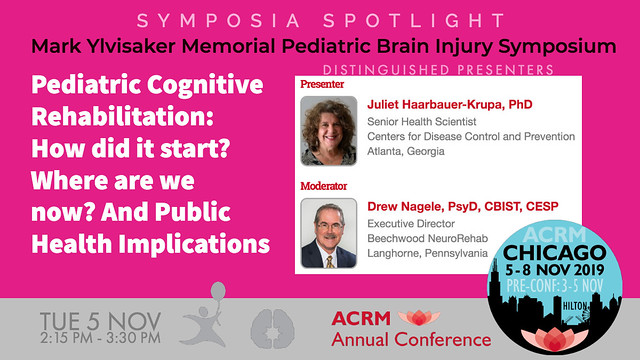
Cognitive Rehabilitation is an intervention to address the primary impairment resulting from TBI: Cognitive functioning. Over time, the healthcare length of stay for children has been significantly reduced and reports indicate unmet needs for cognitive remediation following TBI. At school, children apply cognitive skills to learning; however, the relationship of cognitive intervention to learning at school has not been fully explored. This talk will present the early viewpoint of pediatric cognitive rehabilitation and the evolution over time. The view of cognitive rehabilitation related to child development, service delivery, and the effects of TBI on school performance will be offered.
Learn more >>
What is the Evidence for Neurofeedback for Attention-Deficit/Hyperactivity Disorder? >>
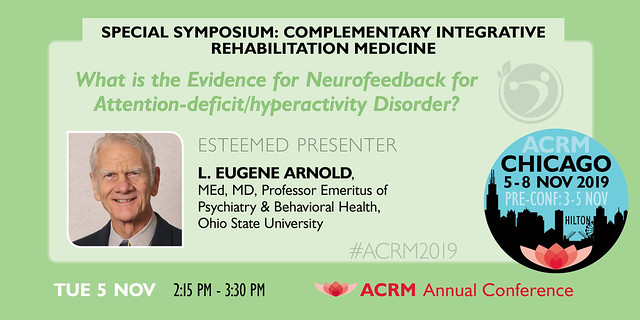
Treatments with long-term benefit for attention-deficit/hyperactivity disorder (ADHD) are needed; one of the more promising is Neurofeedback (EEG Biofeedback), which has several Randomized controlled trials showing significant benefit, but which are inconclusive because they were not Double-Blinded; the benefit could have been nonspecific (placebo response). Because of Neurofeedback’s labor-intensive cost, it is important to know how much specific benefit it yields. This presentation will review and critique the evidence base for neurofeedback (EEG biofeedback (NF) as treatment for ADHD and unveil preliminary results of an NIMH-funded double-blind 2-site randomized clinical trial (RCT) designed to address flaws of previous studies.
Learn more >>
National Survey of Children’s Health >>
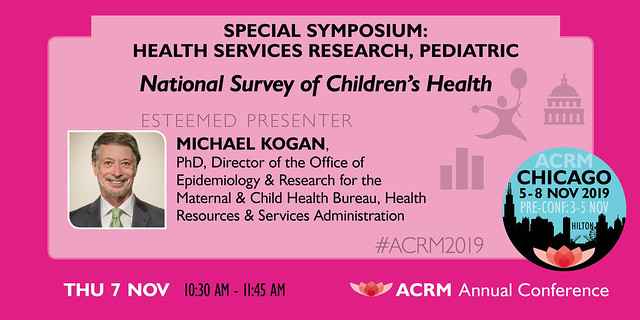
Design and findings of the National Survey of Children’s Health (NSCH) and the National Survey of Children with Special Health Care Needs (NS-CSHCN).
Learn more >>
The Public Health Burden of Traumatic Brain Injury >>
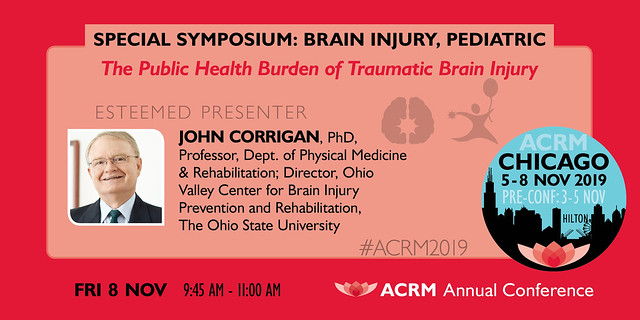
In the past, when estimating the public health burden of traumatic brain injury (TBI), epidemiologists have limited their scope to persons who experience disability immediately and continuously following the most severe injuries, a significant underestimate of the true public health burden. This presentation will share data from recent population-based studies suggesting consequences of TBI among a much larger group of people than those previously considered as being a “prevalent case”. An alternative model will be presented that is based on the principles of toxic exposure. Risk factors for experiencing a variety of adult consequences will be described.
Learn more >>
Awarded Lectureships >>
PEDIATRIC NETWORKING GROUP AWARD LECTURE: Modulating Developmental Plasticity Toward Better Outcomes from Perinatal Stroke >>
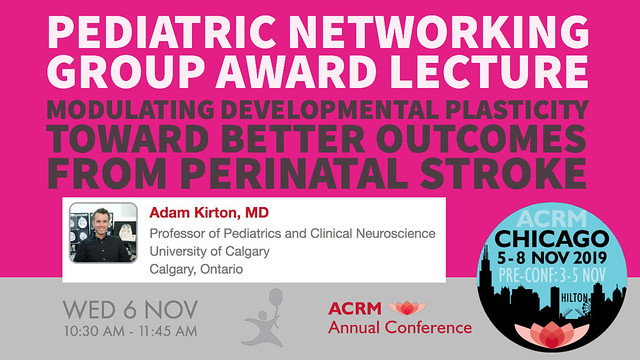
As a focal injury of defined timing in a healthy brain, perinatal stroke is an ideal human model of both cerebral palsy and developmental plasticity. The results and implications of how these models have been translated into clinical neuromodulation trials will be summarized with an eye to future applications that target both the advancement of clinical neuroscience but also patient and family centered outcomes.
Learn more >>
Hot Topics
HOT TOPICS IN PEDIATRIC REHABILITATION: Focus on Family & Caregivers: Clinical & Research Blitz >>
The purpose of this 3rd Annual Hot Topics Symposium is to provide a platform for multiple pediatric clinicians and researchers to highlight their innovations focusing on family and caregivers for children requiring rehabilitation via panel presentation followed by dynamic interaction with the audience. Panelists will be multidisciplinary with content that is cross-cutting. Each panelists will highlight their main programmatic components/outcome measures/findings followed by discussion. Topics covered will include: caregiver training to support a child with brain injury, the use of telehealth for family support, caregiver reported needs, and family programs to support compliance with rehabiliation recommendations.
Learn more >>
Instructional Courses >>
IC 4: Optimizing Pediatric NeuroRecovery: Benefits of early intervention and activity-based therapy >>
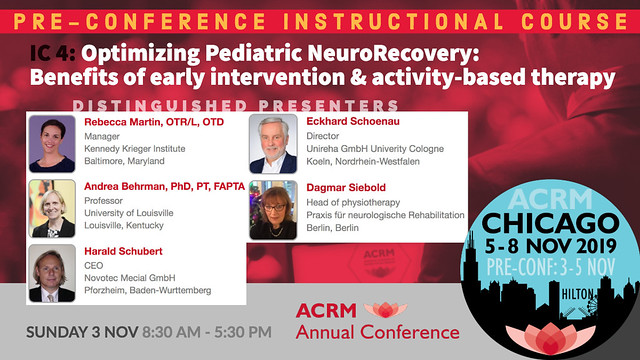
Well-established evidence demonstrates that whole-body activity is essential for the development and repair of the CNS, yet traditional rehabilitation is insufficient to drive neural change. Activity-Based Therapy (ABT) offers high-intensity activation of the nervous system for recovery in early intervention and chronic care. In this course, past clinical assumptions will be compared to recent scientific evidence guiding development of ABT. We will describe various activity-based interventions with case study illustrations and supporting data. Special emphasis will be paid to the benefit of mechano-stimulation and emergent trunk control assessment tools with sufficient sensitivity to measure change in the very young patient.
Learn more >>
IC 10: A Non Pharmacological Treatment Approach to Reduce Pain and Spasticity in the Pediatric Patient >>
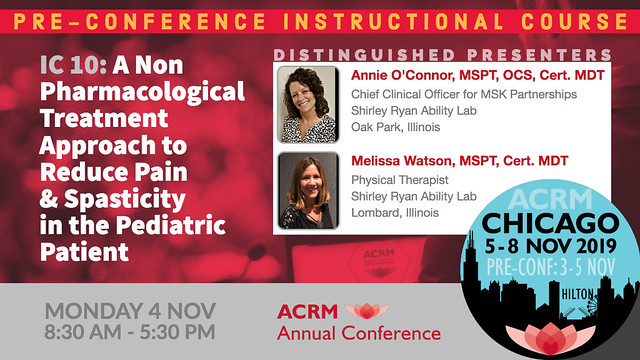
This one day course will introduce a nonpharmlogical exercise approach to decreasing pain and spasticity via lecture, case review, and participatory lab. The course includes a literature review of current pain and spasticity interventions, and introduces a reliable classification system for exercise selection using directional preference and neurodynamic exercise in the pediatric patient. Demonstration of the Pain Mechanism Classification System for pain and spasticity as a clinical reasoning guideline to drive intervention selection of patient education and active execise. Video cases and live patient testimonies of patients will demonstrate how this PMCS impacts neurological pediatric clinical practice.
Learn more >>
IC 11: Evidence Based Multidisciplinary Approach to Adolescent Idiopathic Scoliosis >>
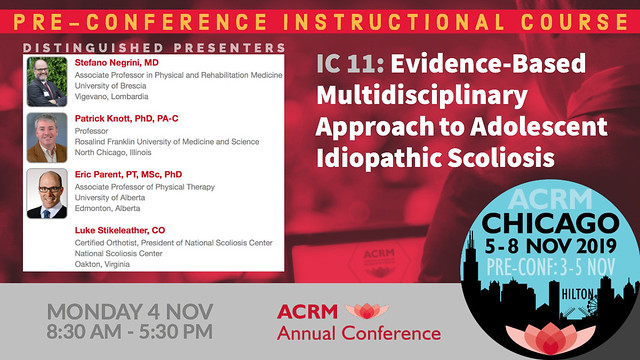
Adolescent Idiopathic Scoliosis (AIS) prevalence is 2-4%; a 20-40° curve has 52-58% probability of surgery; bracing and exercises can change this natural history. Published results, increased public knowledge, and growing awareness by surgeons is driving to requests of conservative (rehabilitation) services. A multidisciplinary team approach is a key to success according to the international Society on Scoliosis Orthopedic and Rehabilitation Treatment – SOSORT. Presenters of this introductory course will include 4 professions (MD, PT, CPO, PhD/PA-C), and 3 SOSORT past presidents. Topics: what AIS is, evaluation, current evidence, bracing and exercises schools, clinical cases: medical, physiotherapeutic and orthotic approach, Q&A.
Learn more >>
IC 23: Early Diagnosis and Management of Cerebral Palsy >>
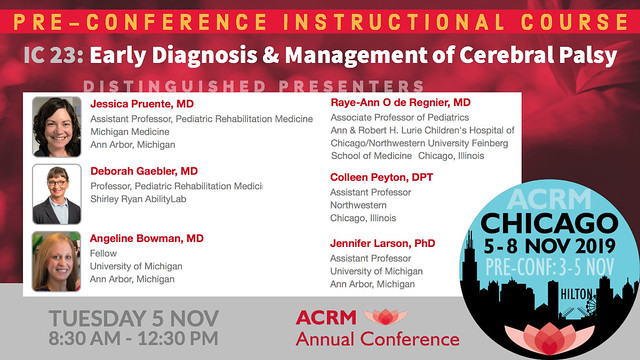
Cerebral palsy is the most common disability in the pediatric population at a rate of 2-3 per 1000 live births. Recent guidelines published in JAMA pediatrics suggest a framework to ensure early diagnosis when possible. This presentation will review the guidelines for early diagnosis, physical and cognitive outcomes after NICU hospitalization, utilization of the General Movement Assessment (GMA), Hammersmith Infant Neurologic Examination (HINE) and developmental assessments, structuring of a NICU follow up clinic, and the added value of physiatry when CP is diagnosed early.
Learn more >>
LEARN MORE | REGISTER | BOOK HOTEL | ONLINE PROGRAM
ACRM 96th Annual Conference | Progress in Rehabilitation Research
CORE: 5 – 8 NOV 2019 // CHICAGO USA // PRE-CONFERENCE: 3 – 5 NOV 2019



